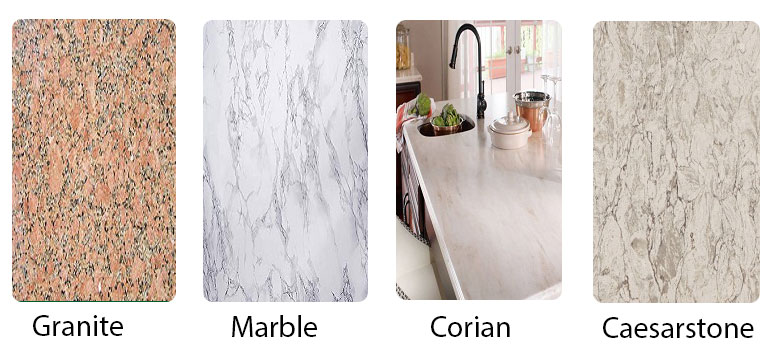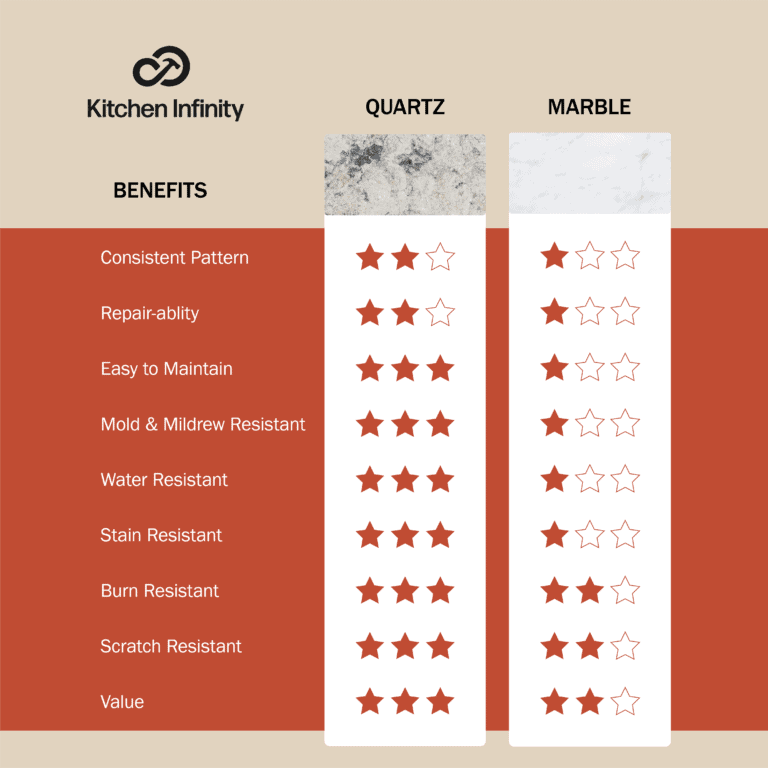Choosing the right countertop material is a crucial decision in kitchen design, and three popular options are quartz, granite, and marble. Each material has its unique characteristics, pros, and cons, making the selection process a matter of personal preference, lifestyle, and budget.
Quartz countertops are engineered stone surfaces made from a combination of crushed natural quartz crystals and resins. One of the primary advantages of quartz is its exceptional durability. It is resistant to stains, scratches, and impact, making it a practical choice for busy kitchens. Unlike natural stones, quartz is non-porous, eliminating the need for sealing and making it highly resistant to bacteria and germs.
Granite countertops, a natural stone option, are renowned for their timeless beauty and durability. Granite is formed from molten rock deep within the earth, giving each slab a unique blend of colors and patterns. One of the notable advantages of granite is its heat resistance, allowing for the placement of hot pots and pans directly on the surface. However, like quartz, granite requires periodic sealing to maintain its resistance to stains.
Marble countertops, another natural stone, are celebrated for their luxurious appearance and timeless elegance. Marble is softer and more porous than granite, making it susceptible to scratches, chips, and stains. Despite its vulnerability to wear and tear, many homeowners appreciate the natural patina that develops over time, adding character to the countertop. Marble countertops often require more maintenance, including regular sealing, to preserve their pristine appearance.

In terms of aesthetics, each material brings a distinct look to the kitchen. Quartz countertops offer a wide range of colors and patterns, often mimicking the appearance of natural stones. Granite countertops showcase the unique beauty of natural stone, with each slab having its own individual characteristics. Marble countertops exude a classic and luxurious appeal, with veining patterns that add a touch of sophistication.
The cost of these countertops varies, and it’s an essential factor for many homeowners. Quartz countertops are often considered mid-range in terms of pricing, falling between the more budget-friendly laminate and higher-end options. Granite countertops, depending on the rarity of the stone, can range from moderate to high in cost. Marble countertops tend to be on the higher end of the price spectrum due to the perceived luxury and exclusivity associated with the material.
Installation is another aspect to consider. Quartz countertops are generally easier to install due to their consistent thickness and weight. Granite and marble, being natural stones, may require additional support and careful installation to ensure stability. Homeowners should factor in installation costs when budgeting for their chosen countertop material.

Maintenance requirements play a significant role in the decision-making process. Quartz countertops are low maintenance, requiring only regular cleaning with mild soap and water. Granite countertops, while durable, need periodic sealing to maintain their stain resistance. Marble countertops, being more porous, demand regular sealing and careful attention to prevent scratches and stains.
Durability is a critical factor, especially in high-traffic kitchens. Quartz countertops are known for their toughness, resisting chips, scratches, and stains effectively. Granite countertops are durable but can be prone to chipping along the edges. Marble countertops, being softer, are more susceptible to scratches, chips, and stains, requiring a delicate touch and regular maintenance to preserve their integrity.
Homeowners with a preference for environmentally friendly options may lean towards quartz countertops. Many quartz manufacturers use sustainable practices and recycled materials in their production processes. Granite and marble, being natural stones, have a lower environmental impact compared to some synthetic materials, but the extraction and transportation processes can still have associated environmental costs.
In terms of design trends, quartz has gained popularity for its versatility. Its ability to mimic the appearance of natural stones while offering a broader range of colors and patterns makes it a versatile choice for various kitchen styles. Granite, with its timeless appeal, continues to be a classic choice, especially in traditional and rustic designs. Marble, synonymous with luxury, is often chosen for high-end and classic kitchen aesthetics.
Resale value is a consideration for homeowners thinking long-term. Quartz, granite, and marble are all considered premium countertop options, and their inclusion can positively impact the perceived value of a home. However, individual buyer preferences vary, and some may prioritize specific materials over others.
The choice between quartz, granite, and marble countertops involves weighing the unique characteristics of each material against personal preferences, lifestyle, and budget constraints. Quartz offers durability and a wide range of design options. Granite brings the beauty of natural stone with heat resistance. Marble exudes luxury but requires more delicate care. Understanding the pros and cons of each material allows homeowners to make an informed decision that aligns with their vision for a functional and aesthetically pleasing kitchen.
Granite vs Marble vs Quartz Kitchen Countertops Ideas

Marble countertops are heat resistant therefore won’t burn or even catch fire, though the finish of the countertop may catch fire when things which are warm are positioned on the surface of the countertop. This kind of services are offered by porcelain or enamel refinishers and also the results can be quite visually appealing.
Quartz vs Granite vs Marble Counter Tops: Which Surface is Best?

Granite vs Quartz countertops. Who is the winner?

Quartz vs Marble Countertop Comparison Kitchen Infinity

Quartz vs Marble Countertops u2013 Mega Stone

Comparing Quartz and Granite Countertops Quartz vs granite

Quartz Vs. Granite Countertops: Which One Is Best for Your Home

Related articles:
- Spots On Marble Countertop
- Dark Green Marble Countertops
- Marble Countertop Backsplash
- Marble Countertop Types
- Maintaining Marble Countertops
- Cultured Marble Countertop Refinishing Kit
- Marble Bathroom Vanity Countertops
- Marble Countertop Radiation
- Refurbishing Marble Countertops
- Cleaning Marble Countertops Kitchen